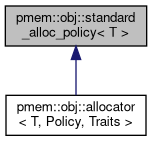pmem::obj::standard_alloc_policy< T > Class Template Reference
The allocation policy template for a given type. More...
#include <libpmemobj++/allocator.hpp>
Inheritance diagram for pmem::obj::standard_alloc_policy< T >:

Classes | |
| struct | rebind |
| Rebind to a different type. More... | |
Public Types | |
| using | value_type = T |
| using | pointer = persistent_ptr< value_type > |
| using | const_void_pointer = persistent_ptr< const void > |
| using | size_type = std::size_t |
| using | bool_type = bool |
Public Member Functions | |
| standard_alloc_policy ()=default | |
| Defaulted constructor. | |
| ~standard_alloc_policy ()=default | |
| Defaulted destructor. | |
| standard_alloc_policy (standard_alloc_policy const &) | |
| Explicit copy constructor. | |
| template<typename U , typename = typename std::enable_if< std::is_convertible<U *, T *>::value>::type> | |
| standard_alloc_policy (standard_alloc_policy< U > const &) | |
| Type converting constructor. | |
| pointer | allocate (size_type cnt, const_void_pointer=0) |
| Allocate storage for cnt objects of type T. More... | |
| void | deallocate (pointer p, size_type=0) |
| Deallocates storage pointed to p, which must be a value returned by a previous call to allocate that has not been invalidated by an intervening call to deallocate. More... | |
| size_type | max_size () const |
| The largest value that can meaningfully be passed to allocate(). More... | |
Related Functions | |
(Note that these are not member functions.) | |
| template<typename T , typename T2 > | |
| bool | operator== (standard_alloc_policy< T > const &, standard_alloc_policy< T2 > const &) |
| Determines if memory from another allocator can be deallocated from this one. More... | |
| template<typename T , typename OtherAllocator > | |
| bool | operator== (standard_alloc_policy< T > const &, OtherAllocator const &) |
| Determines if memory from another allocator can be deallocated from this one. More... | |
Detailed Description
template<typename T>
class pmem::obj::standard_alloc_policy< T >
The allocation policy template for a given type.
Can be specialized, if necessary, for a given type. Designed to be used with C++ allocators.
Member Function Documentation
◆ allocate()
template<typename T >
|
inline |
Allocate storage for cnt objects of type T.
Does not construct the objects.
- Parameters
-
[in] cnt the number of objects to allocate memory for.
- Exceptions
-
transaction_scope_error if called outside of an active transaction. transaction_out_of_memory if there is no free memory of requested size. transaction_alloc_error on transactional allocation failure.
◆ deallocate()
template<typename T >
|
inline |
Deallocates storage pointed to p, which must be a value returned by a previous call to allocate that has not been invalidated by an intervening call to deallocate.
- Parameters
-
[in] p pointer to the memory to be deallocated.
- Exceptions
-
transaction_scope_error if called outside of an active transaction. transaction_free_error on transactional free failure.
◆ max_size()
template<typename T >
|
inline |
The largest value that can meaningfully be passed to allocate().
- Returns
- largest value that can be passed to allocate.
Friends And Related Function Documentation
◆ operator==() [1/2]
template<typename T , typename OtherAllocator >
|
related |
Determines if memory from another allocator can be deallocated from this one.
- Returns
- false.
◆ operator==() [2/2]
template<typename T , typename T2 >
|
related |
Determines if memory from another allocator can be deallocated from this one.
- Returns
- true.
The documentation for this class was generated from the following file:
- libpmemobj++/allocator.hpp